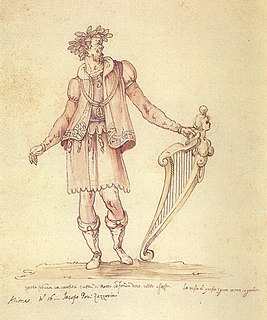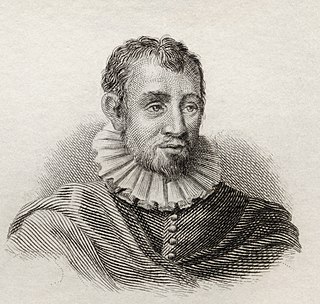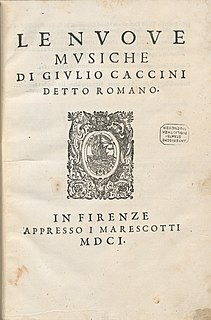Related Research Articles
An oratorio is a large musical composition for orchestra, choir, and soloists. Like most operas, an oratorio includes the use of a choir, soloists, an instrumental ensemble, various distinguishable characters, and arias. However, opera is musical theatre, while oratorio is strictly a concert piece – though oratorios are sometimes staged as operas, and operas are sometimes presented in concert form. In an oratorio, the choir often plays a central role, and there is generally little or no interaction between the characters, and no props or elaborate costumes. A particularly important difference is in the typical subject matter of the text. Opera tends to deal with history and mythology, including age-old devices of romance, deception, and murder, whereas the plot of an oratorio often deals with sacred topics, making it appropriate for performance in the church. Protestant composers took their stories from the Bible, while Catholic composers looked to the lives of saints, as well as to Biblical topics. Oratorios became extremely popular in early 17th-century Italy partly because of the success of opera and the Catholic Church's prohibition of spectacles during Lent. Oratorios became the main choice of music during that period for opera audiences.

Jacopo Peri, known under the pseudonym Il Zazzerino, was an Italian composer and singer of the transitional period between the Renaissance and Baroque styles, and is often called the inventor of opera. He wrote the first work to be called an opera today, Dafne, and also the first opera to have survived to the present day, Euridice (1600).
The year 1600 in music involved some significant events.

Agostino Agazzari was an Italian composer and music theorist.

L'Orfeo, sometimes called La favola d'Orfeo[la ˈfaːvola dorˈfɛːo], is a late Renaissance/early Baroque favola in musica, or opera, by Claudio Monteverdi, with a libretto by Alessandro Striggio. It is based on the Greek legend of Orpheus, and tells the story of his descent to Hades and his fruitless attempt to bring his dead bride Eurydice back to the living world. It was written in 1607 for a court performance during the annual Carnival at Mantua. While Jacopo Peri's Dafne is generally recognised as the first work in the opera genre, and the earliest surviving opera is Peri's Euridice, L'Orfeo is the earliest that is still regularly performed.

In music history, the Roman School was a group of composers of predominantly church music, in Rome, during the 16th and 17th centuries, therefore spanning the late Renaissance and early Baroque eras. The term also refers to the music they produced. Many of the composers had a direct connection to the Vatican and the papal chapel, though they worked at several churches; stylistically they are often contrasted with the Venetian School of composers, a concurrent movement which was much more progressive. By far the most famous composer of the Roman School is Giovanni Pierluigi da Palestrina, whose name has been associated for four hundred years with smooth, clear, polyphonic perfection. However, there were other composers working in Rome, and in a variety of styles and forms.

Emilio de' Cavalieri, or Emilio dei Cavalieri, the spellings "del" and "Cavaliere" are contemporary typographical errors, was an Italian composer, producer, organist, diplomat, choreographer and dancer at the end of the Renaissance era. His work, along with that of other composers active in Rome, Florence and Venice, was critical in defining the beginning of the musical Baroque era. A member of the Roman School of composers, he was an influential early composer of monody, and wrote what is usually considered to be the first oratorio.

Giulio Romolo Caccini was an Italian composer, teacher, singer, instrumentalist and writer of the late Renaissance and early Baroque eras. He was one of the founders of the genre of opera, and one of the most influential creators of the new Baroque style. He was also the father of the composer Francesca Caccini and the singer Settimia Caccini.

Ottavio Rinuccini was an Italian poet, courtier, and opera librettist at the end of the Renaissance and beginning of the Baroque eras. In collaborating with Jacopo Peri to produce the first opera, Dafne, in 1597, he became the first opera librettist.

Italian opera is both the art of opera in Italy and opera in the Italian language. Opera was born in Italy around the year 1600 and Italian opera has continued to play a dominant role in the history of the form until the present day. Many famous operas in Italian were written by foreign composers, including Handel, Gluck and Mozart. Works by native Italian composers of the 19th and early 20th centuries, such as Rossini, Bellini, Donizetti, Verdi and Puccini, are amongst the most famous operas ever written and today are performed in opera houses across the world.

Euridice is an opera by Jacopo Peri, with additional music by Giulio Caccini. It is the earliest surviving opera, Peri's earlier Dafne being lost. The libretto by Ottavio Rinuccini is based on books X and XI of Ovid's Metamorphoses which recount the story of the legendary musician Orpheus and his wife Euridice.

Edda Moser is a German operatic soprano. She was particularly well known for her interpretations of music by Mozart. Her 1973 recital LP Virtuose Arien von W.A. Mozart received the Grand Prix du Disque.

The art form known as opera originated in Italy in the sixteenth and seventeenth centuries, though it drew upon older traditions of medieval and Renaissance courtly entertainment. The word opera, meaning "work" in Italian, was first used in the modern musical and theatrical sense in 1639 and soon spread to the other European languages. The earliest operas were modest productions compared to other Renaissance forms of sung drama, but they soon became more lavish and took on the spectacular stagings of the earlier genre known as intermedio.
Euridice is an opera in a prologue and one act by the Italian composer Giulio Caccini. The libretto, by Ottavio Rinuccini, had already been set by Caccini's rival Jacopo Peri in 1600. Caccini's version of Euridice was first performed at the Pitti Palace, Florence, on 5 December 1602. Caccini hurriedly prepared the score for the press and published it six weeks before Peri's version appeared.
Ernst Märzendorfer was an Austrian conductor.
The Magnificat Baroque Ensemble, or Magnificat, is an early music ensemble of voices and instruments specializing in the Baroque music of the 17th century under the artistic direction of Baroque cellist Warren Stewart. Stewart founded the ensemble in San Francisco in 1989 with Baroque harpsichordist Susan Harvey. Harvey resigned in 2000, and the group has remained under the sole musical direction of Stewart since then. The group derives its name from the first word of the Latin translation of the Canticle of Mary in the Gospel of Luke, Magnificat anima mea, "My soul magnifies the Lord", which is sung during the Roman Catholic evening prayer or vespers service.
Monika Frimmer is a German soprano in opera and concert.
Núria Rial is a Spanish soprano. In recent years, Rial has specialized in the music of the renaissance and baroque eras, such as the works of Handel and Monteverdi. Her repertoire also includes Johann Sebastian Bach, Mozart opera roles, and German, French, Catalan and Castillian art songs.
Lodovico Bellanda was an Italian composer and organist who lived in the transition period between the Renaissance and Baroque eras. He was born and worked most of his life in Verona, for which reason he was also known as Lodovico Veronese.
References
Notes
- ↑ Clements, Andrew (4 February 2005). "CD Review: Cavalieri: La Rappresentatione di Anima". The Guardian . Retrieved 4 June 2017
- ↑ Steinhammer (2007)
- ↑ Hitchcock, Cavalieri
Sources
- Murray C. Bradshaw, and Agostino Manni, Emilio de'Cavalieri, Rappresentatione di anima, et di corpo: 1600, (American Institute of Musicology, 2007).
- H. Wiley Hitchcock: "Cavalieri, Emilio de'", Grove Music Online, ed. L. Macy (Accessed 4 July 2007), (subscription access)
- H. Wiley Hitchcock, "Cavalieri, Emilio"; also "Opera", "Intermedio", "Peri", "Rappresentatione". The New Grove Dictionary of Opera, (MacMillan, 1992).
- Composing opera from Dafne to Ulisse Errante, (translated Tim Carter), Practica musica No. 2 (Kraków : Musica Jagellonica, 1994). (English translations of prefaces to 17th-century Italian operas, by Rinuccini, Peri, Caccini; Marco da Gagliano, Cavalieri, Agazzari, Vitali, Mazzocchi, Ottavio Tronsarelli, Landi, Michelangelo Rossi, and Giacomo Badoaro. Includes Italian originals.)
- Steinheuer, Joachim (2007). "Orfeo (1607)", in The Cambridge Companion to Monteverdi, ed. J. Whenham and R. Wistreich, pp. 119–140. Cambridge: Cambridge University Press. ISBN 978-0-521-69798-9